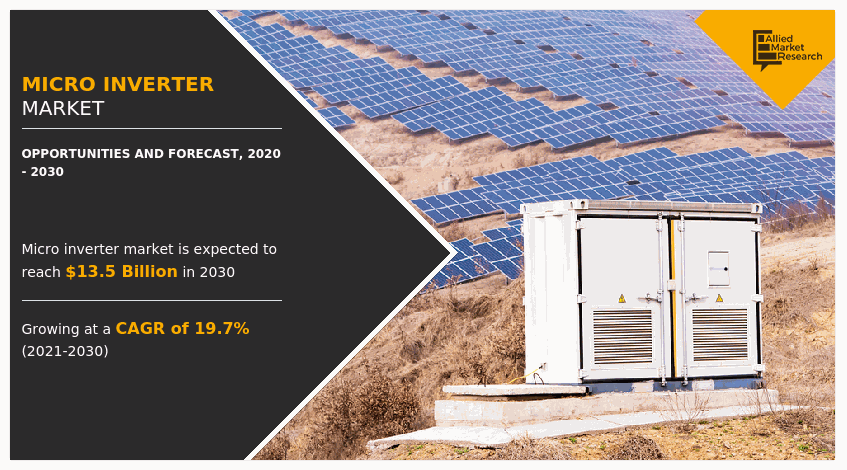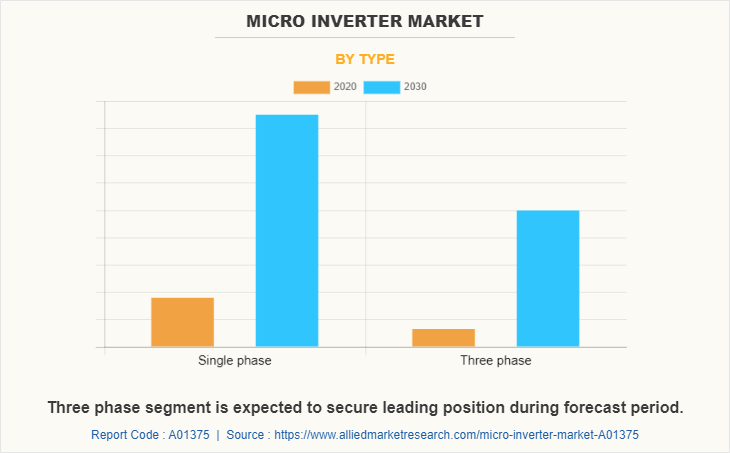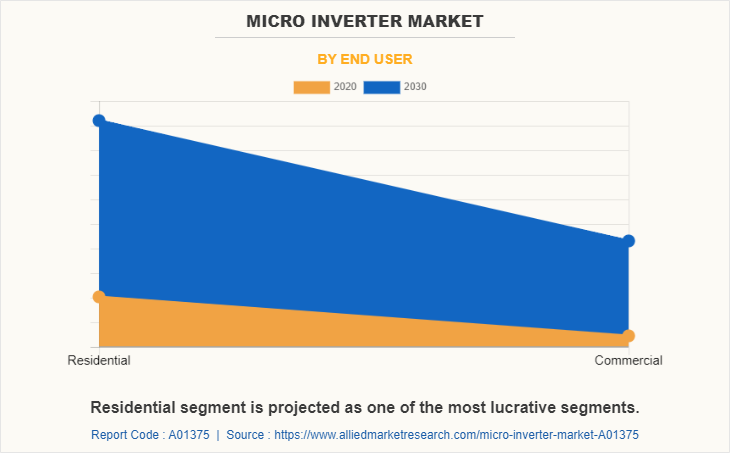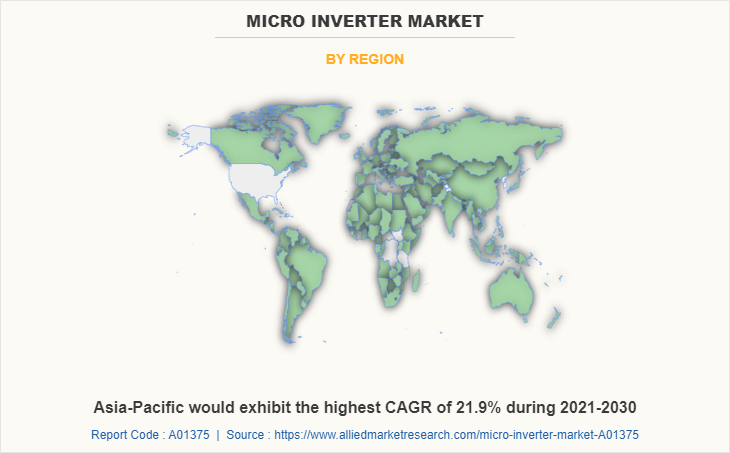Micro Inverter Market Reseach, 2030
The Global Micro Inverter Market size was valued at $2.4 billion in 2020, and is projected to reach $13.5 billion by 2030, growing at a CAGR of 19.7% from 2021 to 2030.
A micro inverter is an electrical device that converts direct current (DC) from solar modules into alternating current (AC) in photovoltaic systems. These inverters are often installed separately on each solar panel to convert DC power to AC power at the device power source. In addition, a micro inverter is easy to install and has simpler operations, compared to string inverters and central inverters. Furthermore, it also helps to produce optimal power, by performing maximum power point tracking (MPPT) for the connected module. Moreover, it offers several benefits over traditional inverters, such as greater reliability, higher production, and improved safety.

Growth of the global micro inverter industry is driven by factors such as technical advantages over other conventional solar inverter, design flexibility, and capabilities like producing maximum power from solar panels. In addition, surge in need for sustainable & clean energy on account of increase in concerns regarding greenhouse gases emissions boost the market growth. However, higher installation and maintenance cost acts as a major restraint for the micro inverter market. On the contrary, rise in the number of solar photovoltaic (PV) installations for various applications across the globe is expected to fuel the micro inverter market growth during the forecast period.
Key Takeaways
- The global market study covers 20 countries. The research includes a segment analysis of each country in terms of value for the projected period.
- More than 1,500 product literatures, industry releases, annual reports, and other such documents of major market industry participants along with authentic industry journals, trade associations' releases, and government websites have been reviewed for generating high-value industry insights.
- The study integrated high-quality data, professional opinions and analysis, and critical independent perspectives. The research approach is intended to provide a balanced view of global markets and to assist stakeholders in making educated decisions to achieve their most ambitious growth objectives.
Key Market Dynamics
The micro inverter market is experiencing robust growth driven by the increasing adoption of solar energy systems and the need for efficient energy conversion. Further advancements in solar technology, rising energy costs, and government incentives for renewable energy installations driving its growth.
However,micro inverter market growth may be restrained by high initial installation costs and competition from traditional string inverters, which offer lower upfront expenses.
Despite the hindrance there are opportunities lie in the growing demand for smart grid solutions and energy management systems, which require efficient inverter technology. In addition, expanding residential solar installations and innovations in micro inverter design, such as improved efficiency and durability, present significant growth opprtunity. The integration of Internet of Things (IoT) capabilities for real-time monitoring and management further enhances market potential, appealing to both residential and commercial sectors.

Segment Overview
The micro inverter market is segmented into Type, Connection and End User. By type, it is classified into fan in single phase and three phase. Depending on connection, it is categorized into stand alone and grid connected. On the basis of end user, it is divided into residential and commercial.

Region wise, micro inverter market trends are analyzed across North America (the U.S., Canada, and Mexico), Europe (the UK, Germany, France, and rest of Europe), Asia-Pacific (China, Japan, India, Australia, and rest of Asia-Pacific), and LAMEA (Latin America, the Middle East, and Africa). Asia-Pacific dominated the micro inverter market in 2020, and is projected to register significant growth rate during the forecast period, owing to growth in the grid connected segment. In addition, Asia-Pacific is expected to witnesses significant growth by the end of the forecast period, followed by North America.

Leading micro inverter industry manufacturers such as Delta Energy Systems GmbH, Enphase Energy Inc., SolarEdge Technologies Inc., and SMA Solar Technology AG focus on their investments on technologically advanced, cost-effective, and more secure products and solutions for various applications. Product such as enphase micro inverter iq7, solar panel micro inverter, and micro grid tie inverter are in the latest trend.
Regional/Country Market Outlook
The global micro inverter market share is experiencing substantial growth, with Asia-Pacific playing a pivotal role in this expansion. Asia-Pacific leads the market, propelled by rapid solar energy adoption, favorable government policies, and increasing investments in renewable energy infrastructure. The region's growing awareness of energy efficiency and rising electricity costs further drive demand for advanced solar solutions, making it a key player in the global market. North America micro inverter market fueled by increasing residential solar installations, supportive government policies, and technological advancements. The region's focus on renewable energy and energy independence enhances demand, positioning it as a significant player in the global market.
- In July 2023, Enphase Energy has started shipping its first U.S.-made microinverters from Columbia, South Carolina. This move is part of their strategy to expand manufacturing within the United States
Top Impacting Factors:
The prominent factors that impact the micro inverter market growth include rise in solar system installation in residential areas and surge in renewable energy investment. In addition, features of micro inverter, such as increase in reliability & safety, and higher output & cost-efficiency fuel the market growth. However, high installation cost restricts the market growth. On the contrary, rise in government spending on renewable energy projects is expected to create lucrative growth opportunities for the market.
Competition Analysis
Competitive analysis and profiles of the major micro inverter market players such as ABB Group, Delta Energy Systems GmbH, Enphase Energy Inc., Involar, P & P Energy Technology Co Limited, ReneSola, Siemens AG, SMA Solar Technology AG, SolarEdge Technologies Inc., and SunPower Corporation have been covered in the report.
Report Coverage & Deliverables
This report delivers in-depth insights into the micro inverter market covering type, connection, end user and key strategies employed by major players. It offers detailed market forecasts and emerging trends.
Type Insights
Single-phase micro inverters are ideal for residential applications, offering ease of installation and cost-effectiveness. In contrast, three-phase micro inverters cater to commercial and industrial sectors, providing higher power output and efficiency for larger installations.
Connection Insights
Stand-alone micro inverters are designed for off-grid applications, enabling independent energy generation, while grid-connected micro inverters integrate with the utility grid, allowing for efficient energy export, enhanced monitoring, and optimized performance in solar power systems.
End User Insights
Residential users benefit from easier installation and energy management, while commercial users require higher efficiency and scalability for large installations. Both segments are increasingly adopting micro inverters to enhance energy efficiency and maximize solar energy utilization.
Regional Insights
North America and Asia-Pacific dominate the micro inverter market, driven by increasing solar adoption and supportive government policies. Europe follows, with a focus on renewable energy initiatives and sustainability. In contrast, the Middle East and Africa are emerging markets, gradually adopting micro inverters as awareness of solar benefits grows, supported by declining technology costs and expanding infrastructure.
Key Strategies and Developments
- In April 2022, Delta has developed an optical storage and charging bi-directional inverter (BDI), which integrates the conversion and control of AC and DC power for household electricity infrastructure, rooftop solar power, energy storage batteries, and EV charging.
- In March 2023, ABB announced that its investment in Direct Energy Partners is part of its broader strategy to enhance its technology leadership in the energy transformation market. The company is also known for its Smart Power solutions, which are designed to improve resiliency, sustainability, and productivity through digitalization and high-quality electric power.
Key Benefits For Stakeholders
This study comprises analytical depiction of the global micro inverter market size along with current trends and future estimations to depict imminent investment pockets.
The overall micro inverter market analysis is determined to understand the profitable trends to gain a stronger foothold.
The report presents information related to key drivers, restraints, and opportunities with a detailed impact analysis.
The current micro inverter market forecast is quantitatively analyzed from 2020 to 2030 to benchmark the financial competency.
Porter’s five forces analysis illustrates the potency of the buyers and the micro inverter market share of key vendors.
The report includes the market trends and the market share of key vendors.
Micro Inverter Market Report Highlights
| Aspects | Details |
| By Type |
|
| By Connection |
|
| By End User |
|
| By Region |
|
| Key Market Players | SMA Solar Technology AG, ABB Group, P and P Energy Technology Co Limited, SolarEdge Technologies Inc., Enphase Energy, Inc, Delta Energy Systems GmbH, ReneSola, Involar, SunPower Corporation, Siemens AG |
Analyst Review
The global micro inverter market is flourishing at a rapid pace. However, high initial installation cost is still a concern for new entrants. Market players generously invest in R&D activities to develop improved solutions to reduce the overall cost of micro inverter products. In addition, according to industry experts, it is essential to optimize affordable prices for micro inverter products for long-term growth.
In March 2022, Delta Energy Systems GmbH launched new solar inverter series the M100A Flex three-phase inverter for residential and commercial segment. The new devices have a power range of 15 to 250kW and can be used in residential and commercial rooftop photovoltaic (PV) projects.
Key players of the market focus on introducing technologically advanced products to remain competitive in the market. Partnership, acquisition, and product launches are expected to be the prominent strategies adopted by the market players. Asia-Pacific accounted for a major share of the market in 2020, owing to the presence of major players in the region. In addition, Asia-Pacific is expected to grow at the highest CAGR, owing to rise in adoption of micro inverter market in various fields.
The global micro inverter market was valued at $2.43 billion in 2020
Asia-Pacific dominated the micro inverter market in 2020
Delta Energy Systems GmbH, Enphase Energy Inc., SolarEdge Technologies Inc., and SMA Solar Technology AG
Micro inverter with remote monitoring capabilities are in the latest market trend.
It is widely used in residential sector.
Loading Table Of Content...



